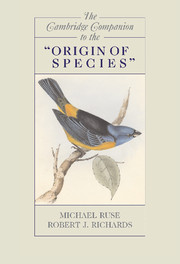Book contents
- Frontmatter
- Foreword
- Introduction
- 1 The Origin of the Origin
- 2 Darwin’s Analogy between Artificial and Natural Selection in the Origin of Species
- 3 Variation and Inheritance
- 4 Darwin’s Theory of Natural Selection and Its Moral Purpose
- 5 Originating Species: Darwin on the Species Problem
- 6 Darwin’s Keystone: The Principle of Divergence
- 7 Darwin’s Difficulties
- 8 Darwin’s Geology and Perspective on the Fossil Record
- 9 Geographical Distribution in the Origin of Species
- 10 Classification in Darwin’s Origin
- 11 Embryology and Morphology
- 12 Darwin’s Botany in the Origin of Species
- 13 The Rhetoric of the Origin of Species
- 14 “Laws impressed on matter by the Creator”? The Origin and the Question of Religion
- 15 Lineal Descendants: The Origin’s Literary Progeny
- 16 The Origin and Political Thought: From Liberalism to Marxism
- 17 The Origin and Philosophy
- 18 The Origin of Species as a Book
- Bibliography
- Index
16 - The Origin and Political Thought: From Liberalism to Marxism
Published online by Cambridge University Press: 28 January 2009
- Frontmatter
- Foreword
- Introduction
- 1 The Origin of the Origin
- 2 Darwin’s Analogy between Artificial and Natural Selection in the Origin of Species
- 3 Variation and Inheritance
- 4 Darwin’s Theory of Natural Selection and Its Moral Purpose
- 5 Originating Species: Darwin on the Species Problem
- 6 Darwin’s Keystone: The Principle of Divergence
- 7 Darwin’s Difficulties
- 8 Darwin’s Geology and Perspective on the Fossil Record
- 9 Geographical Distribution in the Origin of Species
- 10 Classification in Darwin’s Origin
- 11 Embryology and Morphology
- 12 Darwin’s Botany in the Origin of Species
- 13 The Rhetoric of the Origin of Species
- 14 “Laws impressed on matter by the Creator”? The Origin and the Question of Religion
- 15 Lineal Descendants: The Origin’s Literary Progeny
- 16 The Origin and Political Thought: From Liberalism to Marxism
- 17 The Origin and Philosophy
- 18 The Origin of Species as a Book
- Bibliography
- Index
Summary
The publication of the Origin of Species propelled Darwin to the status of a public figure, and although he himself preferred to remain secluded in his country house at Downe and pursue specialised research, his theory was at the centre of a heated debate on the social and political implications of evolution. The key principles of Darwin’s biology - the struggle for existence and natural selection - became subject to a wide spectrum of interpretations ranging from laissez-faire liberalism to Marxism. This state of affairs raises some interesting questions concerning the claims and arguments advanced by proponents of such opposing views in defence of their positions. Simultaneously, one may inquire after Darwin’s own political opinions. This chapter proposes to examine these questions through a close study of reactions to the publication of the Origin from three different sources: first, the somewhat misleading enthusiasm of Herbert Spencer, the great philosopher of evolution and an advocate of an extreme type of individualism; second, the progressive attitude of Clémence Auguste Royer, the first translator of Darwin’s Origin into French; and finally, the comments made by the authors of the Communist Manifesto, Karl Marx and Friedrich Engels. All three offer particularly interesting case studies, since Darwin expressed his own opinions of their claims regarding his theory, mostly in private correspondence.
- Type
- Chapter
- Information
- The Cambridge Companion to the 'Origin of Species' , pp. 295 - 313Publisher: Cambridge University PressPrint publication year: 2008



